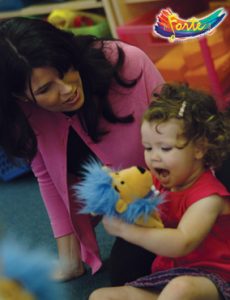Baby music and how it improves children’s learning
Experiencing music from a young age helps the brain of a baby and young children make stronger brain connections. This helps with speech development, numeracy, improving the child’s attention span and acquiring social skills. Baby music lessons with your child can make a huge impact on his/her development.
 Neural pathways are starting to build soon after inception. After birth, these brain cell pathways are created and enhanced through sensory stimulation. Mums singing to her baby and moving them in time to music really does help make connections in his or her brain.
Neural pathways are starting to build soon after inception. After birth, these brain cell pathways are created and enhanced through sensory stimulation. Mums singing to her baby and moving them in time to music really does help make connections in his or her brain.
This makes music a wonderful medium for sharing and expressing emotion and researchers have concluded that a strong emotional bond is developed when parents sing to their children.
As children grow rhythm and movement will encourage language skills, gross and find motor development. Musical activities help children to notice differences, make decisions and act on the things that they see and hear.
Gillian Erskine’s son, Fraser, my god son, from the age of 6 months was one of our first test case dummies in Forte’s Jungle Music program. Now at the age of 17, he is an exceptional musician, having just passed his Grade 8 Trumpet with distinction and playing piano at a similar level. Fraser is also an accomplished gymnast as well as high achieving academic student about to commence his final year of high school.
I have experienced this with my own students who have achieved great results in both music and academic endeavours.
Starting baby music lessons builds an amazing bond between mother and child. This experience sets children up for future learning and helps to develop memory, problem solving techniques and stimulates higher brain learning.
If you would like more information about the Forte’s Jungle Music program, feel free to download the Special Report. The report details how to harness the hidden power of music to create smarter, happier, healthier, more confident and capable children.
In a blog I wrote for Tim Topham on How to Build an Early Childhood Music Program from Scratch – feel free to read it.
Music for Life – what does that mean?
Back in 1993 when Gillian Erskine and I were developing and creating Forte, we were really trying to work out why we were doing this whole music school thing.
Getting to the “why” was a challenge. Our team came up with many ideas and thoughts. The usual thing of: music is important to learn, learning music makes you smarter, music enhances your brain’s ability to think and the list goes on.
Our goal was to find a short phrase that encompassed all the benefits of learning music. We came up with “Music for Life”.
Looking back on the eve of our 24th year of Forte School of Music, does “Music for Life” still mean something to our organisation? Yes, I believe it continues to embraces what we would like to achieve with each and every student who learns music with us.
After 30 years in the music education game (23 years with Forte), I have had the opportunity to see so many wonderful examples of “music for life”. In 1998 I went to New York, literally for the weekend to see one of our students, Ali Wood (who commenced lessons with Gillian), become the first Australian Pianist to debut at Carnegie Hall in New York. Wow what an experience!
I’ve taught students who have gone on to perform in bands, study music at Universities and Conservatoriums around the country, even perform with Symphony Orchestras. Every school owner in the Forte network has equally exciting stories of student successes.
All of this talent is fantastic and one small percentage of the student base across all the Forte schools. The many other students that learn and continue to enjoy playing music well after finishing lessons is an equally important triumph!
Music makes a difference in children’s lives. We, as music educators, can make a difference by being flexible to the needs of students so that we can truly engage children in music for life.
- 1
- 2
- 3
- 4
- Next Page »